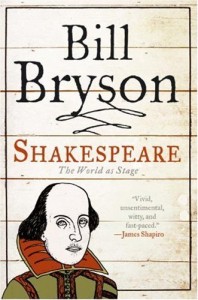It is because we have so much of Shakespeare’s work that we can appreciate how little we know of him as a person. If we had only his comedies, we would think him a frothy soul. If we had just the sonnets, he would be a man of darkest passions. From a selection of his other works, we might think him variously courtly, cerebral, metaphysical, melancholic, Machiavellian, neurotic, lighthearted, loving, and much more. Shakespeare was of course all these things—as a writer. We hardly know what he was as a person. (19)
I’ve read several of Shakespeare’s plays this month, so I though it was about time I read a biography of the man himself. Shakespeare: The World as Stage by Bill Bryson is a slim book, which makes sense, since, as Bryson explains, we actually know very little about Shakespeare the man. Bryson does a good job at giving us the facts that we do know about Shakespeare’s life, and telling us what others have speculated but reminding us that it’s just that, speculation, and debunking the theories that just seem ridiculous.
Bryson takes us through the parts of Shakespeare’s life that are known, from his family to his arrival as a playwright. He discusses how much Shakespeare influenced the English language, providing a plethora of new words and phrases that are now a regular part of our vocabulary.
Bryson gives us a picture of the world Shakespeare lived in, a London devastated by plague, racked by poverty and unemployment,a time when transportation was by foot or horseback and up to 70% of the male population was illiterate, where plays were performed in the same theaters as animal baiting. “That an audience that could be moved to tears one day by a performance of Doctor Faustus could return the next to the same space and be just as entertained by the frantic deaths of helpless animals may say as much about the age as any single statement could.” (72)
I enjoyed this brief biography. Bryson provides information and stories in a witty way. It’s fast-paced, easy to read and I truly feel like I’ve learned more about Shakespeare, about England, and about the theater. And I’ve realized how thankful we should be that John Heminges and Henry Condell, two of Shakespeare’s close friends and colleagues took the time and effort to produce the a folio edition of his plays after his death. If it hadn’t been for them, all the plays may have been lost.”Now that is true heroism.” (157)
I’m not a big biography reader, but I am certainly glad I picked this one up. It was a joy to read, even if my husband’s eyes glazed over whenever I had to share a bit with him.
4½ out of 5 stars
Category: Biography
First published 2007
199 Pages
Part of the Eminent Lives Series
Book source: Library
Shakespeare Reading Month is hosted by Allie at A Literary Odyssey.

I know…hm, ok I do not know much, almost nothing really in the end
I had no idea Bryson has written a biography of Shakespeare. I bet it’s a good one.
This is actually the first Bryson I’ve read, but definitely not the last.
I don’t know how I’ve gone so long without reading Bryson. Thos one looks good.
I’ll have to pick up a copy of this one. Thanks for the review!
I think I have this one my shelf somewhere as I am both a Bryson and Shakespeare fan so I am glad to hear it lives up to its praise!
Have you seen the recent movie Anonymous, which questions Shakespeare’s authorship of the body of work and posits that Shakespeare stood in for another writer who did not want to be accused of being a playwright, something not for the noble in those days. A good movie but all false premises, I’m sure. Good to know that Shakespeare’s friends printed his works after his death and allowed us to know them.
No, I haven’t seen it but I want to. The last chapter of this one actually talks about a lot of the various claims and debunks them.
I love Bill Bryson. A Short History of Nearly Everything is one of my all-time favorite books. I am so psyched to read this book, as I love Shakespeare and I know it will be hilarious. I do love the quote about the animal baiting. 🙂 Thanks for your review!